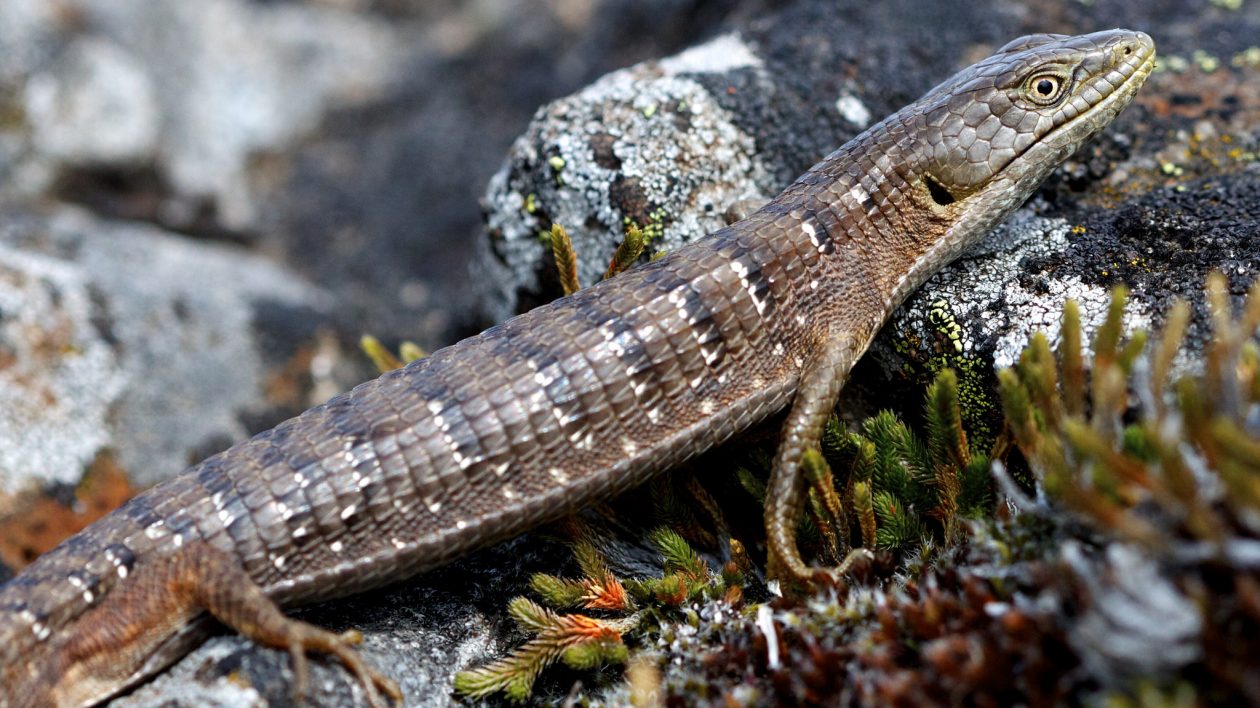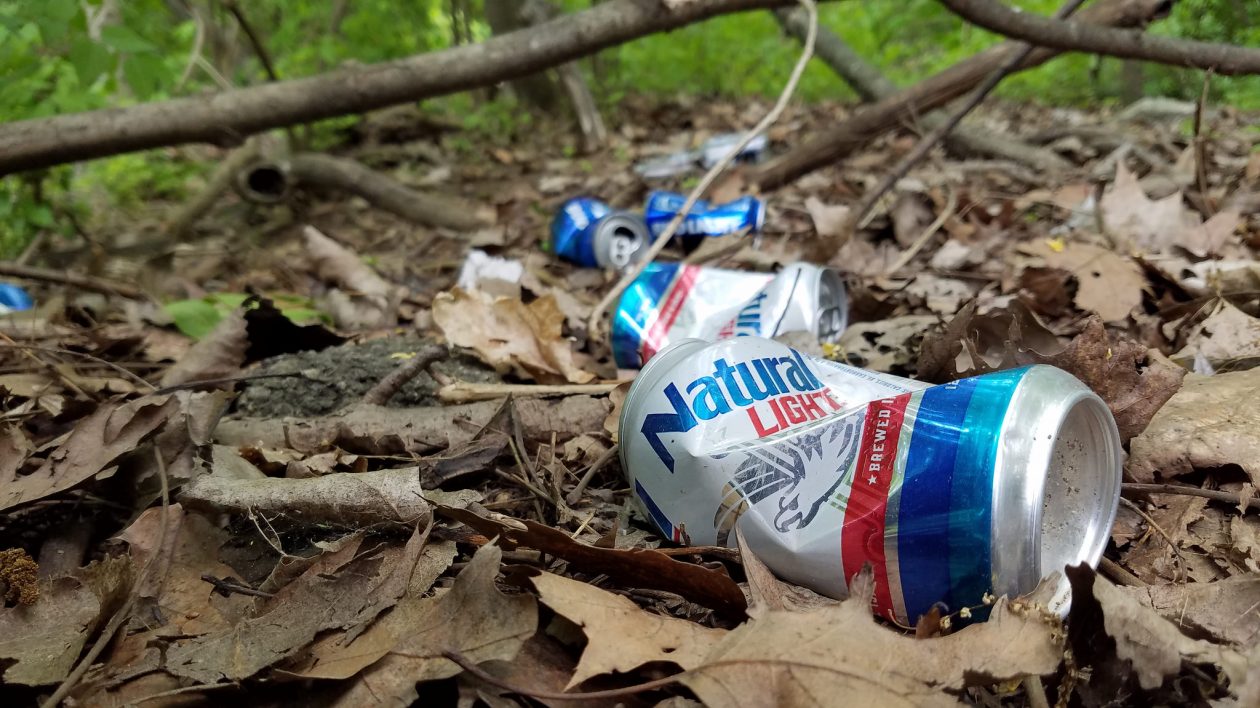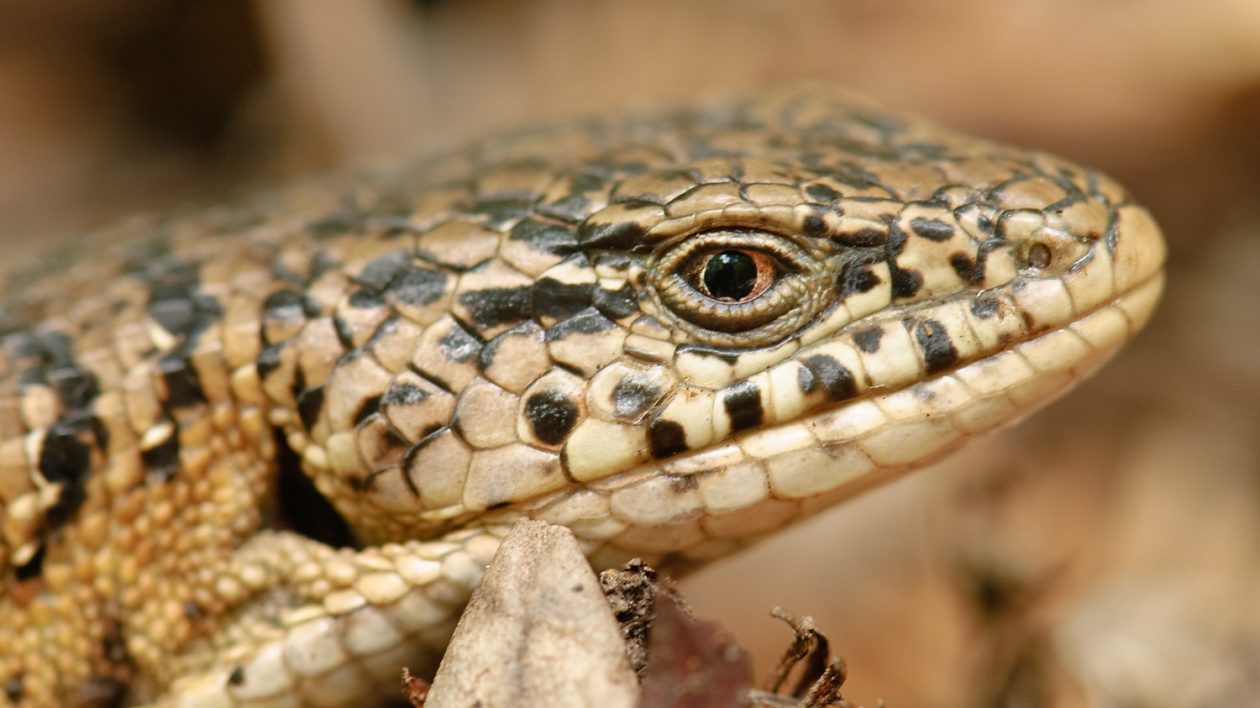When Nature Conservancy staffers tossed a discarded beer can into the back of their truck, they didn’t pay much attention. They routinely pick up trash they find during the course of fieldwork.
Then a lizard popped its head out.
The video above shows the bizarre find made by staffers Melissa Olson and Jason Nuckols, who were working on the Conservancy’s innovative Willamette Confluence Restoration Project. When Nuckols cut open the can, he found three alligator lizards.
Jokes aside, why would three large lizards hole up in a beer can? We break down what is going on here – and why it’s not as unusual as you think.

Boozing It Up?
Stories abound of drunken animals, but most of them are more myth than fact.
Certainly, many wildlife species can and do become inebriated. Recently, drunken birds in Minnesota made national news. The birds were noticeably disoriented and veering perilously close to passing cars. Berries in this town had fermented earlier than usual, causing the tipsy behavior.
Many other species get drunk. Male fruit flies are more likely to feed on fermented fruit if they’ve been rejected by females. Many butterflies and moths also seek out overripe fruit. Home gardeners know that putting out a pan filled with beer will trap pesky slugs and earwigs – provided the neighborhood dogs don’t gulp it up first.
However, despite all the anecdotes, there isn’t much evidence that many animals seek out an alcoholic buzz. In most instances, drunkenness is an accidental side effect of consuming fermented fruit. Researchers point out that inebriation would be a stressful experience for an animal that has to remain alert to stay alive.
And some stories of drunken animal behavior don’t hold up to scientific scrutiny. For more than a century, everyone knew that elephants gorged on overripe marula fruit and became blitzed. You can still find this story widely disseminated, but research has shown that it is certainly untrue.
Reptiles, like birds, can get drunk. However, there is not even anecdotal evidence that reptiles seek out and consume alcohol.
These lizards were not in it for the beer. It was all about the can.

Deadly Shelter
There are two species of alligator lizard in Oregon, the northern and southern. Their ranges overlap and they look similar, but the lizards in the can appear to be the southern variety. The alligator lizard is a fascinating critter: it feeds primarily on large invertebrates but is also recorded hunting small rodents, birds and other lizards. It routinely eats prey longer than it is.
Both species of alligator lizard regularly seek out shelter under rocks and logs, and in crevices. These are adaptable animals, so human-made shelters do just fine. They will take refuge in house foundations and in garages, and under trash. Or, as is the case here: in trash.
This is not unusual for lizards. A hole could lead to a warm shelter, a place where bugs and other food is hiding, or a refuge to hide from predators. A beer can thus offers seemingly endless possibility. But it’s often a trap.
Once lizards crawl into a can, it can be difficult to find their way back out. In the hot sun, a can will often overheat, killing the lizard.

With three fairly large alligator lizards inside this can, there is a good chance they would not have made it back out without the assistance of the dedicated Nature Conservancy staffers.
Discarded cans and bottles are overlooked death traps for wildlife around the globe. A study in the United Kingdom examined bottles and cans tossed along roadsides, and a staggering 10 percent contained native voles and shrews. The researchers estimated that more than three million rodents died in discarded refuse each year in the UK.
The three alligator lizards popping out of the beer can is undoubtedly a funny and surprising find. But our staff won’t be able to pick up every discarded piece of junk. If you’re reading this blog, you presumably already know littering is bad.
And cleaning up the junk you find in the woods is not just removing eyesores. You may well be saving the lives of native creatures.



Disheartening how much stolen lizards, etc. are sold in Europe. Double Disheartening how many more animals die because their capturing animals don’t give a damn and just check their traps when it’s convenient or when their bank accounts get low. To bad we cannot comfortably catch them in equally dangerous situations – and refill the trap and forget it’s whereabouts.
It’s amazing what different pieces of litter can do to wildlife. We’ve all heard about straws, balloons and six-pack rings. Now cans. I’m happy the lizards were rescued. I’ll be sure to inspect every can I pick up!
I always wonder who would go into a forest, and toss away cans and bottles. Why are these people in natural areas if they don’t appreciate them? Your article has introduced me to the new concern of trash as traps. Thank you for educating me.
In southern Nevada, it is not uncommon to find Side-blotched Lizards in roadside cans. Presumably, they were seeking shelter, but if the can is tipped up, they too can become trapped. The same for bottles, but here bottles seem to catch more bees and beetles. While in grad school in Georgia, we routinely examined roadside bottles to collect shrew skulls for the museum. Even trash cans can trap lizards; I recently released to Yellow-backed Spiny Lizards that were trapped in a 30-gallon metal trash can. The common thread here is that these cans and bottles act like pit-fall traps, which is a standard technique for catching all sorts of ground-dwelling creatures, so it is not surprising that we find creatures in discarded “pit-fall” traps. For people familiar with the scourge of open-pipe mining claim markers in the west (https://www.birdandhike.com/Markers/_Markers_Intro.htm) and the Poo-Poo Project (http://tetonraptorcenter.org/our-work/poo-poo-project/), these are just another type of pit-fall trap. We need to remove or cap all of the inadvertent pit-fall traps that we can find.
Interesting article and good to know.
While cleaning up what had been known as Evergreen Slope at the arboretum at Cornell I found a glass bottle with five shrew skeletons in it. They were not at all difficult to extract, but why five? My best guess is that a shrew entered the bottle for reasons unknown. A second shrew found the first shrew, got into the bottle and ate the first shrew. Repeat three more times. The engorged shrew was unable to get through the narrow neck of the bottle. Repeat three more times. End of story and five shrews. I was taking a course in the vertebrates of New York and had to examine many skeletons and even trap a mouse and prepare a museum specimen. Five shrew skeletons was therefore of interest (and easily identified by their dark tipped teeth).
As a college biology student, one of my summer jobs was working at a number of Iowa state parks/campgrounds. In late summer, the tiger salamanders would “migrate” at the campground at Spirit Lake – they would suddenly show up – in the men’s urinals, which drained into the floor and were always damp from fresh well water used for flushing. In the morning, I’d find bucketloads of them, so I’d rescue them, take them outside and let them go. Next morning – same thing! I assumed they were attracted to the restroom lights, or perhaps the bugs that flew to the lights. Otherwise, a person wouldn’t see them, certainly not in any number. I always worried they would be damaged from their experience.
In Oregon, perhaps a bottle/can deposit, successful in Iowa, is not such a hassle after all. Get those cans picked up!
No wonder they seem content dozing in the sun. Who knew
Having seen reports of skunks caught in the plastic rings from sodas(or beer) a bear cub with its head in some kind of plastic tub – all kinds of wildlife are endangered by this kind of littering. At least these lizards were free to do their own thing – thanks to help from humans!
cool article. Glad they saved the lizards
thank you for the education . you can’t know this stuff automatically!
Love it.